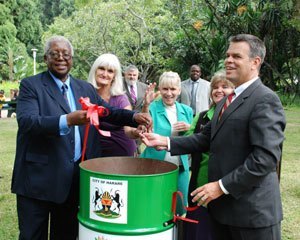
Every worthwhile effort deserves worthwhile results.
Environment with Chipo Masara
This is not so for those people that have at some point taken time to join in clean-up exercises in Harare.
Clean-up campaigns have become a common occurrence in the capital following Harare City Council’s (HCC) admission that waste management had become too overwhelming a task for the authority to handle on its own.
The calls by HCC for other stakeholders to join in and offer all the help they could to manage waste, were necessitated by the cholera, typhoid and dysentery outbreaks that hit the country in recent years. The diseases, which many blamed on the unhygienic conditions they lived in, claimed hundreds of lives.
HCC, in spite of insisting on charging all Harare residents a refuse collection fee, often did not bother to collect refuse. It blamed the non-collection on the lack of sufficient garbage compactors.
Left with no choice, people took to dumping their garbage just anywhere, seeing little mountains of litter being a common sight in most residential areas. And then they were some that decided burning their garbage was the best way to get rid of it.
This is still the case in most residential areas like Mbare, Budiriro, Mufakose, Warren Park, Dzivaresekwa, Glen View to mention but a few.
- Zim among Africa’s top 5 diaspora funds recipients
Keep Reading
It is the dirt that engulfed Harare’s central business district however, that became a cause for more concern.
Harare, once hailed as the “Sunshine City”, mostly owing to its aesthetic values that made it a worthwhile destination, had evidently lost all of its allure and vibrancy.
This is because owing to the decade-long economic downfall the country faced, the service sector literally collapsed and people seemed to have bigger things to worry about than maintaining their environs.
Cleanliness seemed to have become quite a secondary issue! As a result, dirt accumulated and “due to lack of funds”, the responsible authority failed to contain the situation, until it reached the currently prevailing unprecedented levels.
Today however, there are individuals, private companies and organisations that have come forward to say enough is enough and that it is time Harare, and indeed the whole of Zimbabwe claimed back the lost glory.
The media and social networks are everyday filled with calls for a “zero litter” Zimbabwe, calling on people to “Bin it”!
Most notable in the anti-littering fight are organisation such as Miracle Missions, the Proudly Zimbabwean Foundation (PZF) and the corporate world that has since joined the good fight.
But in spite of all the clean-up efforts, people still continue to litter, and the city is still a long way from being clean.
‘Reduce, re-use and recycle’
Besides volunteer cleaners, the Harare City Council cleaners can be seen going through their cleaning routines every day, only for the cleaned-up areas to be littered again in no time.
This then begs the question: Is holding clean-ups enough to end the litter scourge bedevilling Harare?
As far as I can see, people can clean-up all they want, even on a daily basis if they choose to, but as long as all the identified problems are not tackled, the United Nations World Tourism Summit (scheduled for August) will come and find Zimbabwe still in its present appalling state.
Instead of the event being a perfect opportunity for the country to gain back tourists’ confidence, it will serve only to portray it as the kind of country that one would visit “at their risk”!
Among factors identified as contributing to making Zimbabwe dirty were a serious lack of bins, people’s wrong mindset towards littering, loss of national pride, lack of enforcement of the anti-littering law, non-collection of refuse and not being innovative with waste.
The country is definitely in need of more bins.
People need to be made aware that littering is not only an embarrassing habit, but it is very illegal and carries a US$50 fine. Law enforcers need to do their job and start arresting people for throwing litter around.
Zimbabweans should realise there is a lot of potential for business in waste and that nothing should be allowed to go to waste. Reducing, re-using and recycling should be terms everyone is familiar with. And as for the responsible authorities, they should start honouring their pledge to serve the people and stop dishing out the “lack of funds” mantra!
Only if and when all these factors are put together, will litter become a thing of the past in Zimbabwe!











